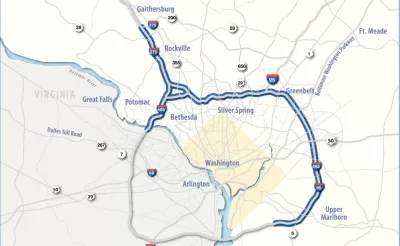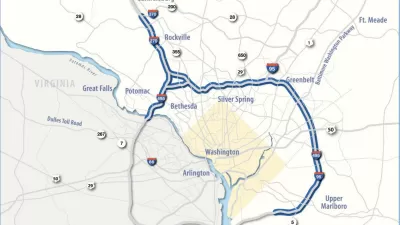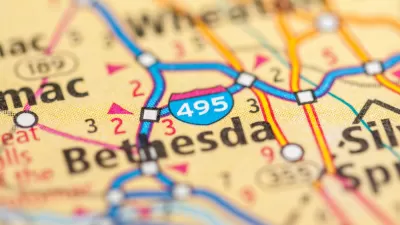Maryland Governor Wes Moore is differentiating his new administration from his predecessor’s, but some projects, like the widening of federal highways in the Capital Beltway, stay the same.

Observers hopeful that new Maryland Governor Wes Moore’s commitment to the defunct Red Line transit project in Baltimore was a sign of a less auto-centric vision for the future of transportation in Maryland might be disappointed.
Gov. Moore is moving forward with a plan to widen parts of the Capital Beltway and Interstate 270—a key piece of former Governor Larry Hogan’s transportation planning agenda for the state. Unlike Hogan’s approach, however, Moore’s vision for the project is scrapping the troubled public-private partnership.
“The Maryland Department of Transportation has applied for a $2.4 billion federal grant that officials said would help the state realize long sought improvements at one of the biggest traffic chokepoints in the Washington region by 2031,” reports Luz Lazo in a paywalled article for the Washington Post.
Lazo adds: “Moore’s plan would rebuild the American Legion Bridge and add managed lanes — such as high-occupancy toll lanes — to parts of the Capital Beltway and Interstate 270, targeting crippling highway congestion at the Virginia state line and in the Maryland suburbs with a focus on transit and more community input, officials said.” Governor Moore claims the widening plan is consistent with his administration’s “Leave No One Behind” agenda. “The transportation network throughout Maryland and the National Capital Region must be able to get people where they need to go in a timely and reliable manner,” said Governor Moore in a press release. “Providing long-desired, equitable transportation solutions in the American Legion Bridge and I-270 corridors is critical to eliminating employment barriers, linking more people to high-demand jobs and stimulating local economies."
The I-495/I-270 Managed Lanes Project has been in the works since 2017, finally gaining federal approval in August 2022 after moving forward in fits and starts over the years and facing local opposition and legal peril.
FULL STORY: Maryland pursues publicly funding Beltway relief project [paywall]

Planetizen Federal Action Tracker
A weekly monitor of how Trump’s orders and actions are impacting planners and planning in America.

Congressman Proposes Bill to Rename DC Metro “Trump Train”
The Make Autorail Great Again Act would withhold federal funding to the system until the Washington Metropolitan Area Transit Authority (WMATA), rebrands as the Washington Metropolitan Authority for Greater Access (WMAGA).

The Simple Legislative Tool Transforming Vacant Downtowns
In California, Michigan and Georgia, an easy win is bringing dollars — and delight — back to city centers.

DC Backpedals on Bike Lane Protection, Swaps Barriers for Paint
Citing aesthetic concerns, the city is removing the concrete barriers and flexposts that once separated Arizona Avenue cyclists from motor vehicles.

In These Cities, Most New Housing is Under 441 Square Feet
With loosened restrictions on “micro-housing,” tiny units now make up as much as 66% of newly constructed housing.

Albuquerque’s Microtransit: A Planner’s Answer to Food Access Gaps
New microtransit vans in Albuquerque aim to close food access gaps by linking low-income areas to grocery stores, cutting travel times by 30 percent and offering planners a scalable model for equity-focused transit.
Urban Design for Planners 1: Software Tools
This six-course series explores essential urban design concepts using open source software and equips planners with the tools they need to participate fully in the urban design process.
Planning for Universal Design
Learn the tools for implementing Universal Design in planning regulations.
Smith Gee Studio
City of Charlotte
City of Camden Redevelopment Agency
City of Astoria
Transportation Research & Education Center (TREC) at Portland State University
US High Speed Rail Association
City of Camden Redevelopment Agency
Municipality of Princeton (NJ)




























